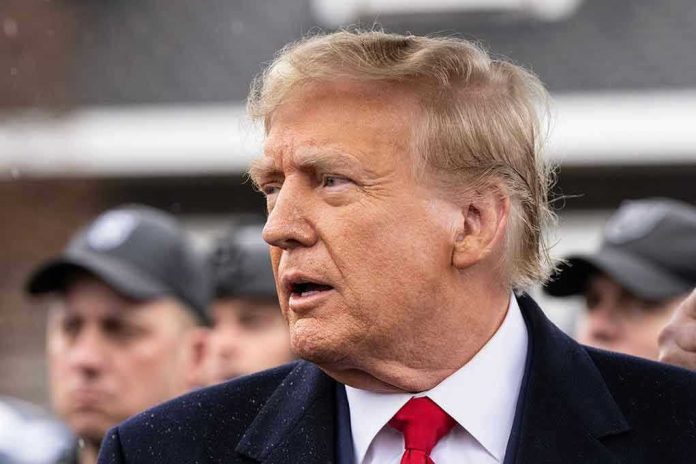
When America’s highest leaders wage a public brawl over who controls the military’s conscience, the real battle isn’t just about law or order—it’s about the very soul of civilian authority in a fractured nation.
Story Snapshot
- Vice President JD Vance accuses six Democratic lawmakers of illegal incitement for urging the military to refuse unlawful orders.
- President Trump amplifies the controversy, labeling the lawmakers “traitors” and calling for their arrest.
- The lawmakers, all with military or intelligence backgrounds, defend their message as a constitutional reminder.
- The debate exposes deep fissures in American civil-military relations amid controversial National Guard deployments.
Lines Drawn: The Lawmakers Versus the Oval Office
Late November 2025, six Democratic lawmakers—each a veteran of military or intelligence service—released a video with a message that crackled with historical weight. They told service members to remember: the Uniform Code of Military Justice does not compel obedience to unlawful orders. As their video spread, it struck a nerve that ran straight to the top. Vice President JD Vance, quick to seize the offensive, declared the lawmakers’ advice “by definition illegal,” launching a legal and political counterattack. This was no mere academic spat. The lawmakers’ military bona fides forced Americans to reconsider where loyalty should lie when politics and military ethics collide.
President Trump, never one to let an opportunity for escalation pass, accused the lawmakers of sedition and called for their imprisonment. His post on Truth Social thundered across the partisan divide, branding the six as “traitors” and invoking the specter of capital punishment. With National Guard units already deployed in cities led by political opponents, Trump’s rhetoric fueled an already volatile atmosphere. The public spectacle revealed how quickly the machinery of government can lurch toward crisis when civilian oversight and military obedience are put on a collision course.
The Legal Fault Lines: Obedience, Defiance, and Precedent
The U.S. military’s tradition of civilian control is enshrined in both law and lore. Article 92 of the UCMJ is clear—lawful orders must be obeyed, unlawful orders must not. That distinction, hammered home after tragedies like the My Lai massacre in Vietnam, is the bedrock of American military ethics. The lawmakers’ reminder was rooted in this precedent. Yet, Vance’s charge of illegality raised an uncomfortable question: when does warning about unlawful orders become subversion rather than civic duty? Legal scholars argue the lawmakers’ message aligns with established military law, but public encouragement to disobey—especially from elected officials—tests the boundaries of propriety and legality.
Senator Elissa Slotkin, one of the six, attempted to de-escalate by clarifying she knew of no instance where Trump had ordered illegal military action. But by then, the controversy had acquired a life of its own, drawing in legal experts, military analysts, and political partisans. The Department of Defense, caught in the crossfire, maintained public silence—a tacit acknowledgment of the sensitivity and potential consequences of the dispute. For many in uniform, the debate was no abstraction; the possibility of being ordered into controversial domestic deployments was all too real.
Power, Precedent, and Political Theater
President and Vice President wield extraordinary authority over the military, but the lawmakers’ backgrounds as veterans and intelligence officers lent their warning unusual credibility. Their message echoed historic warnings, from the aftermath of Watergate to the excesses of the Vietnam era: the imperative that military obedience ends where illegality begins. Trump and Vance, meanwhile, projected a vision of discipline and unity—where public questioning by lawmakers becomes a threat to national stability. The clash was more than personal; it was a test of American assumptions about civilian supremacy and military restraint.
The broader political context made the stakes clear. With National Guard deployments in Democratic-led cities stirring public outrage, and with social media amplifying every accusation, the debate turned into a litmus test for American democracy. Was the lawmakers’ video a responsible defense of principle, or reckless incitement? Legal experts from Harvard Kennedy School weighed in, noting that while the right to refuse illegal orders is foundational, public exhortation by politicians could undermine chain of command and discipline. Retired General Stanley McChrystal, a voice of experience, warned of the dangers of eroding trust in both military leadership and civilian oversight.
Long Shadows: What This Means for America’s Future
No immediate legal action followed, but the episode left scars. The rift between civilian leaders and the military widened, with morale and discipline under fresh scrutiny. For soldiers tasked with enforcing controversial orders, the clear lines of authority had grown hazier. The public, already weary of polarization, watched as the basic principles of governance—civilian control and ethical military conduct—were recast as partisan weapons.
The story’s lasting impact may be in what it foreshadows. Calls for new laws or policies to clarify civilian influence over the military are likely. Legal challenges, reforms, and perhaps even court battles loom. For now, the episode exposes the fragility of trust, both within the halls of government and in the ranks. The next crisis may force even starker choices between obedience, conscience, and loyalty to the Constitution itself.




